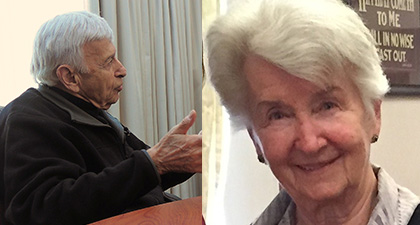TORONTO — Hedy Bohm’s first reaction to being asked to testify in a German courtroom against a former guard at the Auschwitz death camp was “a definite no. I didn’t want to go.”
But the more the 86-year-old survivor of Auschwitz thought about it, the more she realized she was destined to deliver justice in the case.
Bohm, who lives in Toronto, will be one of seven Canadian Auschwitz survivors who will travel to the northern German city of Lüneburg later this month and next to testify against Oskar Groening, a former SS sergeant charged with 300,000 counts of aiding and abetting murder.
That figure corresponds to the number of Hungarian Jews who were sent to the gas chambers immediately on arriving in Auschwitz in the spring of 1944.
The survivors are “co-plaintiffs” in the case – those whose parents, siblings or children were murdered at the camp. They will recount their experiences and what their losses meant in their lives.
There is no Canadian equivalent to their status under German law. Their testimony will come close to the victim impact statement that’s often delivered in criminal cases in this country.
The co-plaintiffs “are a kind of co-prosecution,” explained Rafael Wugalter, a Montreal lawyer and translator who is assisting in the case.
They will not be cross-examined by Groening’s lawyers.
Bohm arrived in Auschwitz in early June 1944 with her parents, who were shunted to their executions “within moments.” She told The CJN that when she was asked to testify, “I couldn’t imagine why I would want to put myself through this. And then later on, I stopped to think about it and what it meant.”
She was swayed, she said, by the entreaties of Thomas Walther, a retired German judge turned Nazi hunter who is representing about 50 co-plaintiffs worldwide and was in Canada a few weeks ago to videotape survivors’ memories.
“He explained that his hope is to have a precedent set and perhaps a new law for the future, where no terrorists [can] claim they are innocent because they didn’t actually cut someone’s head off or pull the trigger,” Bohm said. “He hoped to have a new law for aiding and abetting to be used against anyone, no exception.”
Groening, 93, was charged under that legal definition. Walther has conceded that inmates would not have seen the Nazi guard at Auschwitz because he worked behind the scenes. It was his job to oversee the theft of all cash, jewelry and valuables of arrivals as they were herded off the trains, earning him the moniker “the Bookkeeper of Auschwitz.”
The charges against him are the result of a recent shift in German law, credited to Walther, under which those who did not directly commit atrocities may still be prosecuted as “cogs” in the Nazi death machine.
Testifying against and seeing Groening are “not something I look forward to,” Bohm said. “But it’s something exceptional that I never thought I would have in my life. [It] seems like fate, and I have to be there.”
But, she added, “vengeance is not mine. It’s not my makeup.”
Max Eisen, a local Shoah educator and speaker, also in Toronto, will be cutting short his March of the Living trip to Poland and Israel to testify at Groening’s trial.
Eisen, 85, said he has unique insight into theft at Auschwitz, where he worked in a hospital and operating theatre. Guards would take patients from the wards to the gas chambers, “and [they] came back with bloody rags containing molars filled with gold crowns. I had to remove the gold crowns. I had to do this dirty work for them. They were stealing and [Groening] was the bookkeeper. He was collecting all the loot and they were looting.”
Eisen said he’d like to see Groening get a life sentence, but instead of jail, spend the rest of his life telling students about racism and anti-Semitism. “At least he would do something productive. Would it help? I don’t know. But it’s important that he’s brought to court. At least there is a record that you pay for your bad deeds sooner or later.”
Asked what he would say to Groening, Eisen replied: “How could you as a person be in a place like that, where all this killing and gassing was going on, and collect gold when you knew what was happening to these people? Did you have a conscience? Did you feel that you were hiding behind [the] ‘I was following orders’ [defence]?”
Local Auschwitz survivor Katherine Zahavi, who turns 86 this month and lost more than 40 family members in the Holocaust, told The CJN “there’s not a day” she doesn’t have memories of the camp. “You never forget that, not for a minute.”
She said her decision to testify at Groening’s trial caused friction with her only surviving relative, a sister, who lives in Israel. “She said, ‘How could you go there? How could you step foot in Germany?’ I said, ‘you know what? This is my revenge for my parents, for my sisters, for my whole family. It is the last thing that I can do.’”
Zahavi said she doesn’t feel brave about testifying. “I know it will be very difficult.”
For the Canadian co-plaintiffs, at least, the case has a tinge of irony. Inmates’ valuables were taken to a warehouse at Auschwitz dubbed “Kanada” by prisoners, who were known as the “Kanada Kommando.” To prisoners, Canada symbolized wealth.
As for Groening, he told the German daily Bild in 2005 that he regretted working at Auschwitz, saying he was haunted by the sound of screams from the gas chamber.
“I was ashamed for decades and I am still ashamed today,” he said. “Not of my acts, because I never killed anyone. But I offered my aid. I was a cog in the killing machine that eliminated millions of innocent people.”
His trial begins April 21.
